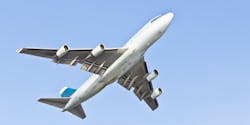Boeing to Downsize Entire Workforce by 10%, 15% in Commercial Airplanes
Boeing CEO Dave Calhoun issued a letter to employees today announcing the Chicago-based aviation manufacturer would reduce its enterprise workforce by 10% through layoffs. In the letter, Calhoun said the coronavirus pandemic has dealt a “body blow” to Boeing via plummeting demand at airlines. The April 29 letter follows an announcement April 2 that Boeing would seek to reduce its workforce by buying out employee contracts.
According to Calhoun, the 10% figure is for all of Boeing—and some parts might be hit even worse. Areas of the businesses that are “most exposed” to the COVID-19 downturn may see their workforces cut by more than 15%, including Boeing’s service business, corporate functions and commercial airplane production.
“Globally, commercial airline revenue is expected to drop by $314 billion this year,” wrote Calhoun. As quarantines and stay-at-home orders have caused domestic air travel demand to plummet, airlines are cutting spending in order to stay afloat by delaying plane purchases, delaying deliveries, and deferring elective maintenance, says Calhoun.
In response to the lack of demand, Calhoun says, Boeing will also reduce its airplane production rates for most aircraft. Production of the 737 MAX will resume in 2020 with plans to produce 31 planes each month in 2021. 787 production will spin down from 10 per month in 2020 to 7 per month in 2022. Production rates for the 767 and 747 models won’t change.
One of Boeing’s partners, GE Aviation, is also reeling from the damage. General Electric, as part of its first quarter earnings report, announced that COVID-19 had negatively impacted their first quarter earnings by at least $1 billion. GE Aviation, a division of General Electric, announced a 14% drop in orders and a 13% drop in revenue compared to last year. GE Aviation announced they would also cut their workforce by 10% earlier in the month.
Boeing has not yet worked out how much funding it will receive from the government. The March 31 CARES Act contained $17 billion for companies deemed critical to national security, a likely reference to Boeing, which also produces planes for the military. But in April 29’s letter, Calhoun said the company is still “exploring potential government funding options.” Calhoun has previously stated that Boeing will refuse any government aid that comes with certain conditions, including partial government ownership of the company.
About the Author
Ryan Secard
Associate Editor
Ryan Secard joined Endeavor B2B in 2020 as a news editor for IndustryWeek. He currently contributes to IW, American Machinist, Foundry Management & Technology, and Plant Services on breaking manufacturing news, new products, plant openings and closures, and labor issues in manufacturing.
